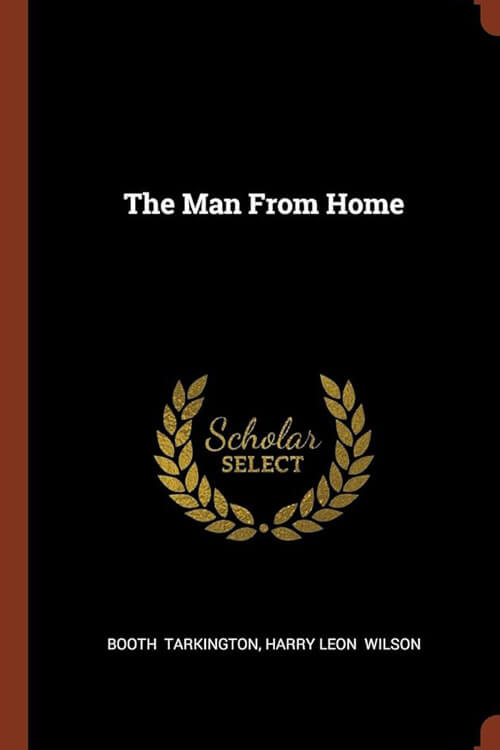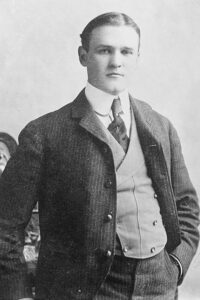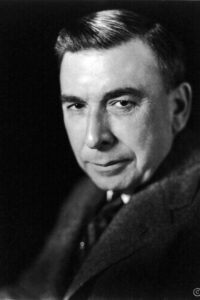
The Man from Home
It was she who found these people. Indeed, we might say that you and I also owe her something.
[Comes around behind the table to MADAME DE CHAMPIGNY.]
Even less captious respectability than Lady Creech’s might have looked askance at the long friendship
[kisses her hand]
which has existed between us. Yet she has always countenanced us, though she must have guessed—a great many things. And she will help us to urge an immediate marriage. You know as well as I do that unless it is immediate, there’ll be the devil to pay. Don’t miss that essential: something must be done at once. We’re at the breaking point—if you like the words—a most damnable insolvency.
[Enter ALMERIC from the grove. He is a fair, fresh-colored Englishman of twenty-five, handsome in a rather vacuous way. He wears white duck riding breeches, light-tan leather riding gaiters and shoes, a riding coat of white duck, a waistcoat light tan in shade, and a high riding stock, the collar of which is white, the “puffed” tie pink; a Panama hat [pg 029] with a fold of light tan and white silk round the crown. Carries a riding-crop.]
ALMERIC
[as he enters]
Hello, Governor!
[His voice is habitually loud and his accent somewhat foppish, having a little of the “Guardsman” affectation of languor and indifference.]
Howdy, Countess!
Read or download Book
Harry Leon Wilson, Booth Tarkington
Harry Leon Wilson (May 1, 1867 – June 28, 1939) was an American novelist and dramatist best known for his novels Ruggles of Red Gap and Merton of the Movies. Another of his works, Bunker Bean, helped popularize the term “flapper”. Harry Leon Wilson was born in Oregon, Illinois to Samuel and Adeline. His father was a newspaper publisher, and Harry learned to set type at an early age. He went to public schools and enjoyed reading Bret Harte and Mark Twain. He learned shorthand and secretarial skills. Wilson left home at 16 and worked for the Union Pacific Railroad as a stenographer in Topeka, Kansas, Omaha, Nebraska, and Denver, Colorado, and eventually, he came to California in 1887. He was a contributor to the histories of Hubert Howe Bancroft and became the private secretary to Virgil Bogue. In December 1886, Wilson’s story “The Elusive Dollar Bill” was accepted by Puck magazine. He continued to contribute to Puck and became assistant editor in 1892. Henry Cuyler Bunner died in 1896 and Wilson replaced him as editor. Wilson’s first wife was Wilbertine Nesselrode Teters Worden, whom he married in 1898. The marriage ended in divorce in 1900. In 1902, he married Rose Cecil O’Neill Latham. O’Neill and Wilson worked together at Puck, and she was the illustrator for four of his books; they divorced in 1907. Wilson’s black and white pit bulldog named Sprangle was the inspiration for Rose O’Neill’s biscuit porcelain Kewpie dog figure, known to the world as “Kewpiedoodle dog” and sold worldwide by importer George Borgfeldt.
Newton Booth Tarkington (July 29, 1869 – May 19, 1946) was an American novelist and dramatist best known for his novels The Magnificent Ambersons (1918) and Alice Adams (1921). He is one of only four novelists to win the Pulitzer Prize for Fiction more than once, along with William Faulkner, John Updike, and Colson Whitehead. In the 1910s and 1920s, he was considered the United States’ greatest living author. Several of his stories were adapted into film. During the first quarter of the 20th century, Tarkington, along with Meredith Nicholson, George Ade, and James Whitcomb Riley helped to create a Golden Age of literature in Indiana. Booth Tarkington served one term in the Indiana House of Representatives, was critical of the advent of automobiles, and set many of his stories in the Midwest. He eventually moved to Kennebunkport, Maine, where he continued his life work even as he suffered a loss of vision.







